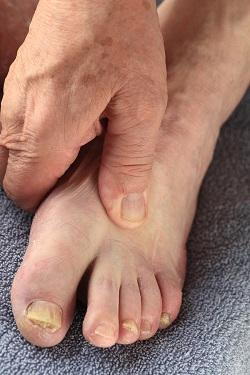Find out how to prevent foot complications from happening to you.

If you’ve been diagnosed with diabetes the first thing you want to do is work with your doctor to create a treatment plan that will keep your blood sugar in check. Making sure your blood sugar is within a healthy range is key to preventing health problems. Of course, one of the most commonly affected areas of the body when you have diabetes is your feet. Our Philadelphia, PA, podiatrists are here to tell you what you can do to prevent diabetic-related foot complications.
Examine Feet Daily
The only way you are going to know if there is a problem with your feet is if you are checking them out thoroughly every day to look for symptoms such as swelling, redness, tenderness to the touch, corns and calluses, cuts, open wounds and other problems that could easily turn more serious. Detecting these problems now and getting the proper care from our Philadelphia foot doctor could prevent serious complications from happening.
Stay Physically Active
One way to keep your blood sugar levels in check is to get up and moving; however, we understand that if you are new to a workout routine you may want to sit down and talk to us about how to start. Furthermore, you’ll want to make sure you have the right shoes and perhaps even custom orthotics to ensure that your feet don’t cause you problems as you begin your new workout regimen.
Keep Feet Clean
Your feet, just like the rest of you, need to be properly cleaned every day. When you get in the shower or the tub make sure you are using soap and water to clean every area of your feet, including between toes. This is a surefire way to get rid of bacteria responsible for infections such as athlete’s foot. Once you get out of the shower, make sure to completely and thoroughly dry off your feet.
Always Wear Shoes
Going barefoot is a bad idea when you have diabetes. This is because a lot of people with diabetes also have some degree of nerve damage in their feet and don’t know when they’ve stepped on something that could cause a foot injury. Wearing socks and shoes ensures that you keep your feet free from cuts, sores and wounds.
Trim Your Toenail
Long toenails can also increase your chances for ingrown toenails. To prevent this problem it’s important to keep your toenails trimmed regularly. Toenails should be trimmed straight across (never at an angle) and should be level with the tips of your toes. Toenails that are trimmed too low are also at risk for an ingrown toenail. Having trouble trimming your nails yourself? No problem; our podiatrist can do that for you!
The Foot & Ankle Group in Philadelphia, PA, and Mount Laurel, Bordentown, and Columbus, NJ, is dedicated to providing patients of all ages with the proper foot and ankle care they need. If you have diabetes you may have questions along the way about your foot care regimen. Turn to our expert podiatric team anytime.

